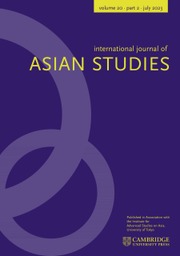Article contents
FOREIGN SILVER COINS IN THE MARKET CULTURE OF NINETEENTH CENTURY CHINA
Published online by Cambridge University Press: 17 January 2007
Abstract
Both the physical qualities of different types of money and the cultural values assigned to them contributed to the determination of their economic value. China began to import substantial quantities of silver coins from Europe as early as the sixteenth century, but it was around 1800 that a foreign coin, the so-called “Carolus peso” issued by the Spanish kings Carlos III and Carlos IV, became the basis of a new monetary standard in China, the yuan. In the nineteenth century the Carolus peso and imitations of it (mostly manufactured in China) served as the principal means of exchange, and the yuan as the standard unit of account, in the markets of South China. This paper analyzes the monetary conditions that led to the establishment of the Carolus peso as the monetary standard of South China with particular consideration of the distinctive “currency circuits” formed by regional variations in monetary circulation. Significant differences can be seen in the monetary regimes that prevailed in Jiangnan and Guangdong, the major commercial centers of the empire. While Guangdong reverted to a commodity money standard that allowed the use of a wide range of different types of physical monies, including “chopped” and broken foreign coins, in Jiangnan the Carolus peso became a unified, fiduciary monetary standard. This regional variation attests to the distinctive regional characteristics of market culture in late imperial China.
- Type
- Asian monetary history revisited [1]
- Information
- Copyright
- Cambridge University Press 2007
- 17
- Cited by




